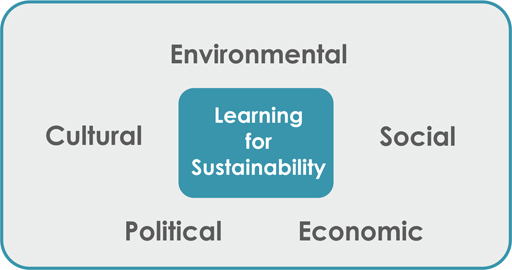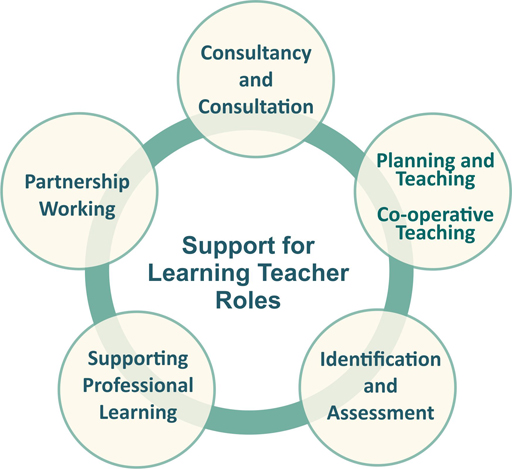Use 'Print preview' to check the number of pages and printer settings.
Print functionality varies between browsers.
Printable page generated Thursday, 5 February 2026, 4:40 PM
6 Learning for sustainability
Introduction
What is Learning for sustainability?
Learning for sustainability represents how a practitioner connects their knowledge and understanding of their learners with the areas highlighted in figure 24. Learning for Sustainability, internationally known as Education for Sustainable Development (ESD), has its roots in the Earth Summit, the UN Conference on Environment and Development, held in Rio de Janiero in 1992.
‘Learning for Sustainability is learning to live within the environmental limits of our planet and to build a just, equitable and peaceful society. It is essential for the well-being of all and is an international priority’.
The professional actions, values, skills and knowledge of Learning for Sustainability are embedded within the Standards for Registration, Career-Long Professional Learning and Leadership and Management, recognising that all teachers should be confident in their knowledge and understating of the challenges facing society locally and globally. More information on this is on the GTCS Learning for Sustainability webpage.
Scotland’s inclusive education system and flexible curriculum framework highly values teacher professionalism. The 2012 suite of Professional Standards accredited by the General Teaching Council for Scotland is one example of the investment which continues to be made with the aim of supporting and building teachers’ skills and capabilities. Education Scotland also provide a range of free professional learning opportunities which support and link with the GTCS standards for professional learning.
The standards for initial teacher education and registration, career-long professional learning and leadership are all underpinned by a set of values aligned to social justice and commitment to inclusive education. For example, expectations related to the inclusive values and attitudes include that teachers can:
- demonstrate an understanding of principles of equality of opportunity and social justice and of the need for anti-discriminatory practices.
- demonstrate respect for the rights of all children and young people without discrimination as defined in the United Nations Convention on the Rights of the Child 1991, the Children (Scotland) Act 1995, the Standards in Scotland’s Schools Act etc 2000 and the Education (Additional Support for Learning) (Scotland) Act 2004.
- demonstrate that they value and promote fairness and justice and adopt anti-discriminatory practices in respect of gender, sexual orientation, race, disability, age, religion, culture and socio-economic background. (TE4I pp4-5)
The GTCS standards for registration of states that all teachers have to:
Commit to the principles of democracy and social justice through fair, transparent, inclusive and sustainable policies and practices in relation to: age, disability, gender and gender identity, race, ethnicity, religion and belief and sexual orientation. These standards are clear and set in the context of equity and social justice.
6.1 Roles and responsibilities
School managers have a range of responsibilities to ensure the school community is inclusive for all their learners and families. Some examples are below.
- Ensure a culture of on-going self-evaluation, evaluate evidence from across the whole school and use this to plan change and further improve.
- Ensure all duties and responsibilities are carried out as required.
- Ensure all planning and implementation takes cognisance of national and local drivers.
HGIOS 4 identifies 5 quality indicators for leadership and management which can help evaluate specific areas of focus.
1.1 Self-evaluation for self-improvement
1.2 Leadership of learning
1.3 Leadership of change
1.4 Leadership and management of staff
1.5 Management of resources to promote equity
Classroom Teachers
Support for all learners begins within the classroom and is provided by the classroom teacherwhoholds the main responsibility for nurturing, educating and meeting the needs of all pupils in their class,working in partnership with support staff to ensure early identification of pupils additional support needs, plan, deliver and review curriculum programmes.
6.2 Five roles of Support for learning teacher/pupil support teacher
Role of the Support for Learning Teacher (SfL Teacher)
The Support for Learning teacher works in partnership with appropriate practitioners and parents to meet the additional support needs of children and young people within their local authority staged level of intervention process. They assist class teachers and school management to ensure that children who have additional needs have those needs identified and met within Curriculum for Excellence.
Support should be delivered through the five well established roles of the Support for Learning teacher:
Figure 25 provides an overview of these roles.
- Consultancy/consultation
Consultancy can take place in many forms, from simply giving advice to working collaboratively with individuals or departments. Effective learning and teaching strategies may be discussed and developed and suitable resources identified and made available. It is important to discuss and reach conclusions on issues such as meeting the needs of learners with a variety of different needs, not just concerning literacy, but also behavioral issues with implications for classroom management, motivation etc. There is likely also to be help regarding the most appropriate resources for the identified needs or individual learners.
- Planning learning and teaching; including co-operative teaching with class teachers
SfL teachers may teach alongside class teachers in the classroom. Clear aims should be set out beforehand and subsequently reviewed. This helps provide direct support to and monitoring the progress of all pupils in class; developing classroom strategies with the subject teacher and assisting in recording and assessment.
Sometimes it is helpful for pupils, individually or in small groups, to work out of class with a member of SfL staff. This can aid the ongoing process of dynamic assessment and establishing what is likely to work best. Blocks of support may be given to larger groups of pupils to focus on development of specific skills. Though this works in primary schools, it is particularly important in secondary schools in preparing learners for important exams and applying for further and higher education. SfL will be involved in planning and delivering specialised/focused programmes.
- Identification and assessment
Working with colleagues to ensure the early identification of pupils additional support needs. SfL will be involved with observations, formative and summative assessments, screening and dissemination/feedback to parents/carers/staff/multi agency colleagues.
The SfL teacher/department holds information on individual pupils and is involved in further ongoing assessment and support when this is appropriate. The SfL teacher has some delegated responsibilities for ensuring that information on individual pupils is appropriately disseminated both in school and to external agencies and parents
- Partnership with specialist services
Partnership working is very important to ensure a holistic approach is taken in gathering information and placing the child/young person at the centre. Support teachers regularly will be in contact with colleagues in schools/educational services and multiagency colleagues e.g. health, social work and voluntary agencies.
- Contributing and supporting professional development
The SfL teacher/department contributes to staff development in a variety of ways through:
- Sharing of insight, experience and resources
- Presentation of in-service sessions: for example twilight collegiate session
- Offering guidance on accessible resources/materials, curriculum, equipment and approaches
- Sharing effective strategies, disseminating information from courses attended.
- Disseminating information to staff on local authority procedures, legislation and guidelines.
These 5 roles are all complementary, and no one role should be carried out in isolation.
Activity 33 Reflections on your practice
Complete the table in your reflective log. Consider how you are able to engage with the 5 roles.
You can now take the End of module quiz.
What next?
Activity 34
For the final entry in your Reflective Log for this module consider the following question and task.
1. How will the completion of this module impact on your professional practice?
2. Look back at your responses to the reflective questions at the start of this module and evidence your professional learning and reflections below now that you have completed module 2. This can also be used in discussion with your line manager and annual reviews.
If you plan to apply for GTC Scotland Professional Recognition after the completion of Module 3 this task will contribute towards the evidence you provide in the application process. A table is available in your reflective log to note your reflections
Reviewing your work
Congratulations – now that you have completed all sections and the end of section quizzes you have reached the end of this module. You may have worked through this module in a number of different ways – perhaps alone, or with a colleague or group of colleagues and have hopefully engaged with the reflective learning log to evidence your professional enquiry and learning.
Feedback
It would be extremely helpful to receive your feedback about this module. We are keen to know about the parts you found useful and where you feel we can improve. You can post your views on our short survey – thank you in advance for completing it.
Useful websites
Additional support needs (http://www.gov.scot/Topics/Education/Schools/welfare/ASL
Education Scotland - Dyslexia and inclusive practice: An overview
Acknowledgements
The development of this module was informed and supported by:
Career-Long Professional Learning Route Map for Dyslexia and Inclusive Practice
General Teaching Council Scotland Professional Standards
Addressing Dyslexia Toolkit Working Group
The Opening Educational Practices in Scotland Project
Except for third party materials and otherwise stated in the acknowledgements section, this content is made available under a Creative Commons Attribution-NonCommercial-ShareAlike 4.0 Licence

